Paydari Party Endorses Saeed Jalili Amid Hardliner Struggle in Iran’s Presidential Race
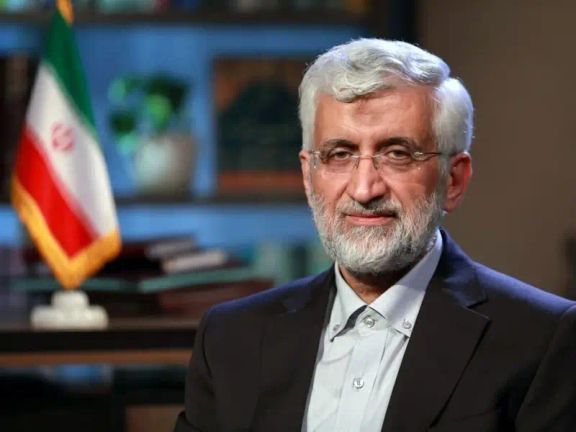
The Paydari party, a bastion of ultraconservatism in Iran, announced its support for Saeed Jalili in the upcoming presidential election on June 28.

The Paydari party, a bastion of ultraconservatism in Iran, announced its support for Saeed Jalili in the upcoming presidential election on June 28.
The endorsement from the party, known as Steadfastness, highlights the division among the five hardliner candidates who are locked in a struggle over who should withdraw in favor of a unified conservative front.
Saeed Jalili, the Supreme Leader’s representative at the Supreme National Security Council, Parliament Speaker Mohammad Bagher Ghalibaf, Tehran Mayor Alireza Zakani, and Vice President Amir-Hossein Ghazizadeh Hashemi are all conservative contenders in the upcoming election.
If they do not agree to propose a consensus candidate, they risk losing in an election that many believe is merely a formality, with the winner already predetermined by Supreme Leader Ali Khamenei.
Originating during the presidency of Mahmoud Ahmadinejad, Paydari has continued to exert influence over Iranian politics. Known for its opposition to the nuclear deal (JCPOA) with world powers, the party's alignment with Jalili, a figure equally critical of the agreement, signals a continuing hardline stance that resonates with the more conservative elements of Iranian society.
As the hardliners fail to consolidate support, the fracturing may offer an unexpected advantage to the only more reformist candidate, Masoud Pezeshkian.
The elections on June 28 come in the wake of the sudden death of Ebrahim Raisi who died in a freak helicopter crash last month. Turnout is expected to be an all time low as the results are already deemed predetermined by the supreme leader.
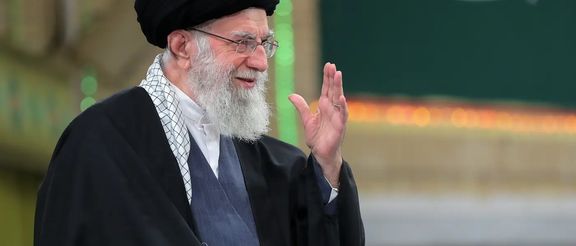
Mohammad Ali Movahedi Kermani, head of Iran's Assembly of Experts, has stated that late President Ebrahim Raisi was unfit to succeed Ali Khamenei as Iran's Supreme Leader.
"He would have definitely rejected the offer if it had been made," Kermani stated, directly addressing speculation about Raisi's potential ascension.
The sudden death of Raisi in a helicopter crash in May abruptly ended what some believed was his grooming for leadership, propelling Khamenei's son, Mojtaba, into the spotlight as a new frontrunner.
The comment highlights the opaque process of choosing Iran's leader, a position that will become vacant following ageing Khamenei's death.
The Assembly of Experts, elected to serve until 2032, is responsible for appointing the next leader, though the identity of the successor remains a closely guarded secret.
The Supreme Leader of Iran is chosen by the Assembly of Experts and serves for life. Article 111 of the Constitution of the Islamic Republic of Iran mandates that if the current Supreme Leader dies or is removed from office, the Assembly of Experts must convene immediately to name a successor.
In the interim, a 'Provisional Leadership Council' takes over the duties of the Supreme Leader. This council consists of the sitting President, the Chief Justice, and a cleric from the Guardian Council selected by the Expediency Discernment Council.
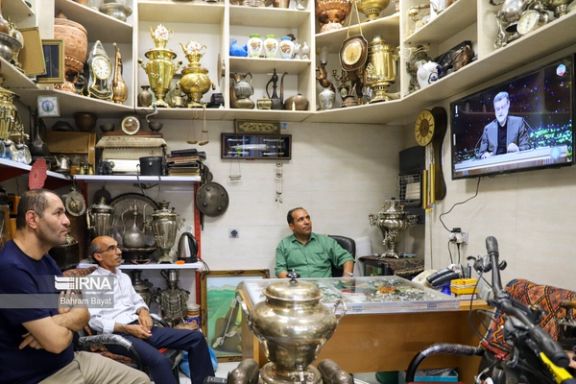
Iranian media and most social media users agree that the second and third televised "debates" among the six hand-picked presidential candidates in Iran last week were even more disappointing than the first one.
As the candidates prepare for their fourth debate on Monday, which will focus on foreign policy, observers are eager to see if any interesting issues or statements will emerge.
Many Iranian journalists, such as Sahand Iranmehr hesitated to call the second debate a "debate" as it was a series of individual monologues or sometimes a conversation between two of the candidates, Rouydad24 website observed.
Among the many problems noted by the media and netizens were the slow pace of the debates, the overly long introduction covering the candidates' arrival, prayers, and their walk through the state TV building, their awkward mumbling of the national anthem (which few knew by heart), and the repetitive, uninspired introduction by the state TV anchor. Even more annoying was the way the candidates were treated like naughty schoolboys in need of constant advice.
Regarding the form and format, these programs seem designed to discourage viewership. Everything about the setting is dull, tasteless, and rather banal. The scheduled 12-minute intermission on Thursday stretched to over half an hour, during which a helpless presenter repeated irrelevant information four times before the candidates returned to the studio, some still chewing the snacks offered by the organizers.
However, the content of the "debates" was even more problematic than the format. There was no meaningful difference among the candidates or their statements. Nearly everyone, except for cleric Mostafa Pourmohammadi in the second debate, who briefly outlined his plans for the presidency, seemed clueless about what they would do if elected.
Many, including the reformist candidate Masoud Pezeshkian said they did not need a plan because they were going to go ahead carrying out Supreme Leader Ali Khamenei's master plan for the country's future.
On the other hand, there was hardly any good speaker among them apart from Pourmohammadi. Some like Mohammad Bagher Ghalibaf and Alireza Zakani had many blunders that social media users joked about later. Zakani's remarks about helping pregnant women turned out to be too embarrassing while his remarks about giving gold to citizens in lieu of cash handouts were so outlandish that it was evident even in the mimics of other candidates.
Pezeshkian even did not defend himself against many attacks by his political rivals particularly Zakani, news websites in Tehran noted. His only significant statement was that he wanted to continue the path started by former reformist President Mohamad Khatami in the late 1990s. This prompted Zakani to say sarcastically that if Pezeshkian is elected president, his government will be Khatami's third term of office as President.
Former President Hassan Rouhani and former Roads and Urban Planning Minister Abbas Akhundi were so offended by some of the remarks made by conservative candidates that they asked for airtime to respond the accusations. As candidates have been "ordered" not to criticize the Raisi administration, they often make offensive remarks about Rouhani and his ministers and blame them even for problems that occurred under the Raisi administration.
Most of chronic problems the country faces, such as a 50% annual inflation rate, are largely the result of US economic sanctions, related to Iran’s nuclear program that is not the domain of any president to decide.
Many critics have noted that pro-reform candidate Masoud Pezeshkian's insistence on not differentiating himself from the conservative candidates is likely to negatively impact voter turnout in the upcoming election. Disillusioned voters may see no positive impact from his election.
Overall, the three rounds of debates on state TV have highlighted several issues with the candidates. They are not effective speakers, lack clear plans, and appear out of touch with Iranian society, showing little understanding of what Iranians want. They tend to create controversies because they have little to discuss about essential issues. Most importantly, none of them seem to have a clear reason for wanting to be Iran's President.
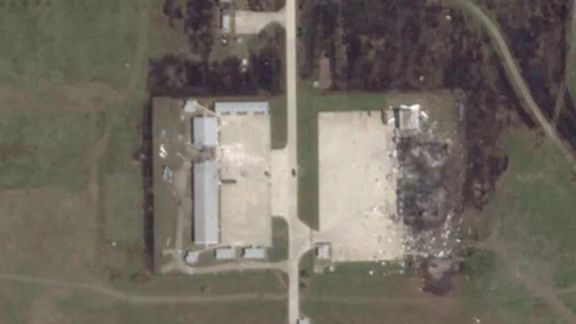
Ukraine's Navy has revealed satellite imagery showing the destruction of a Russian warehouse used for launching Iranian-made drones and training military cadets.
A Facebook post by the Ukrainian Navy detailed, "New satellite images confirm the destruction on the night of June 21 of the Shahed-136/Geran-2 storage and preparation facilities, training buildings, control, and communication points of these UAVs located in the Krasnodar Territory."
Additional images shared on social media depicted the devastation with one warehouse entirely demolished and another significantly damaged. The assault coincides with Russia's claim of downing 114 Ukrainian drones targeting oil refineries and military installations in southern Russia, which purportedly resulted in one civilian casualty from falling debris.
Kyiv's naval officials reported that the strike, which occurred late Friday night, killed several trainers and cadets learning to operate the Iranian Shahed drones which have been used on Ukrainian civilian sites since the war in 2022.
The operation was orchestrated in collaboration with Ukrainian intelligence, highlighting a military response against threats posed by the collaboration between Russia and Iran in utilizing drone technology against Ukraine.
Data from Planet Labs, a US-based satellite company, pinpointed the facility directly across the Sea of Azov from the occupied Ukrainian city of Mariupol.
Russia annexed Crimea in 2014, an action not recognized by the majority of the international community.
Iran has been a key ally to Russia in its conflict with Ukraine. Since mid-2022, Iran has provided Russia with hundreds of Shahed kamikaze drones, which have been widely used to attack civilian infrastructure and urban areas in Ukraine.
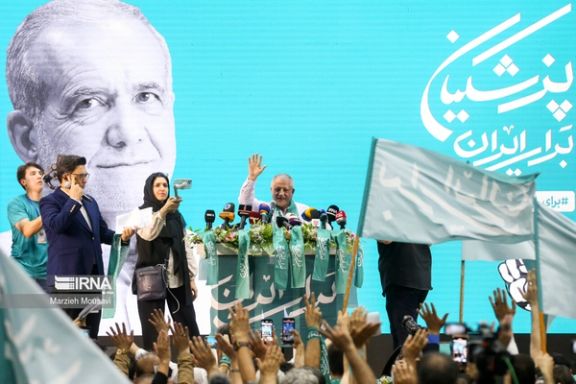
Masoud Pezeshkian, Iran’s pro-reform candidate, is notably non-combative and refrains from personal attacks on other candidates both in and outside of debates. When confronted with attacks, he remains silent.
Regarding agendas and issues, the 70-year-old doctor, commits only to implementing existing policies and laws, steering clear of any controversies.
Former president Hassan Rouhani claims that two candidates, Alireza Zakani and Amir Hossein Qazizadeh, were qualified by the Guardian Council specifically to attack the pro-reform candidate during the debates. This raises the question: does Pezeshkian, as the sole advocate of some reforms, have a chance to win? If he does win, what changes can he deliver in domestic and foreign policies?
Pezeshkian’s chances of winning
Four realities on the ground tell us that we should not consider him a loser at this moment. The first one is that other candidates believe he could win. When Pezeshkian said Zakani is going to withdraw and support another candidate in the third debate, Zakani replied "I will not let you become the president." This means that he believes in the possibility of his victory.
The second notable fact is the anticipated increase in voter participation compared to the 2021 presidential and March 2024 parliamentary elections. With the entry of the Reform Front, which has about 10-15% of the voting base, even if only half of them participate, overall turnout will rise. Not only the Reform Front supports Pezeshkian but historically, in the Islamic Republic, any increase in voter turnout has benefited pro-reform candidates. Still, overall turnout can be less than 50%, a bit higher than in the past two elections.
The third reality is reflected in the poll results from online and security institutions. Although these polls and their conducting institutions are not entirely trustworthy and tend to be biased against reformers, they cannot completely distort the public's opinion. Despite this bias, Pezeshkian consistently ranks first or second in these polls.
The fourth fact is the significant turnout at some of Pezeshkian's rallies in major cities. For instance, his election rally in a sports arena in Shiraz was packed, with several thousand people unable to get inside. A segment of the electorate, albeit small, believes that his presidency could bring about change.
Can a Pezeshkian presidency bring change?
Although Pezeshkian’s opponents and rivals label his potential administration as Hassan Rouhani’s third term, he is likely to be a weaker and less effective executive for three reasons.
First, his personality and background differ significantly from Rouhani's. Hassan Rouhani was one of the founders of the Islamic Republic and was the first to call Khomeini "Imam," elevating him to the status of a Shia saint. Rouhani served in top political and security positions for three decades before becoming president. In contrast, Pezeshkian has only served as the Minister of Health and a lawmaker.
The second reason is Rouhani's substantial electoral support, with over 18 million and 23 million votes in two elections, both with more than 70% voter turnout. This strong mandate allowed him to have some influence on foreign policy. In contrast, Pezeshkian is unlikely to secure such a large number of votes and lacks the ability to turn popular support into a strong mandate.
The third reason is the expanded power of the IRGC and the totalitarian faction during the Raisi administration. Today, all power channels are controlled by military and security ‘mafia’ type groups. Pezeshkian cannot marginalize them and would have to include them in his cabinet. Their influence in the Khatami and Rouhani cabinets was significantly less than the current political reality. Due to Ali Khamenei’s support for these hardliners, Pezeshkian cannot challenge them.
For these reasons, a Pezeshkian administration would not only fail to replicate Hassan Rouhani's but would likely be much weaker and more disastrous. While Rouhani at least demonstratively drafted a charter for citizens' rights, which was quickly forgotten, or criticized the IRGC, Pezeshkian would be unable to even address these issues. Additionally, Rouhani never pledged to follow Ali Khamenei’s policies unquestioningly or to be “melted in him,” a promise Pezeshkian cannot avoid making.
The opinions expressed by the author are not necessarily the views of Iran International.
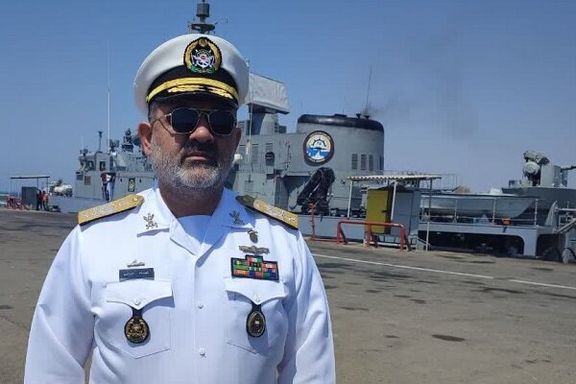
Shahram Irani, the commander of Iran’s Navy, announced that it is a “permanent plan” of Iran's army to maintain a presence on all high seas of the world.
“Currently, the Islamic Republic's naval fleet is present in the Gulf of Aden to support the security of shipping," Irani said Sunday, without referring to the fact that Tehran-backed Houthis have been attacking commercial vessels in the Red Sea and the Gulf of Aden since November.
Irani said that the Iranian Navy also assists ships from other countries in distress.
However, a recent incident highlighted a contradiction in Iran’s stated mission of aiding ships in distress. The United States Central Command (CENTCOM) reported on June 16 that the Iranian frigate IRIN Jamaran ignored distress calls from the Palauan-flagged, Ukrainian-owned bulk cargo carrier M/V Verbena after it was hit by two separate missile attacks by the Houthis.
“The Iranian frigate IRIN Jamaran was eight nautical miles from M/V Verbena and did not respond to the distress call.”
CENTCOM condemned the inaction of the Iranian vessel while referring to a pattern of "malign and reckless behavior" by the Iranian-backed Houthis, asserting that such actions "threaten regional stability and endanger mariners' lives across the Red Sea and Gulf of Aden."
In his Sunday remarks, Irani also referred to the presence of "enemy ships" in the area, saying it "does not advance their cause, and the damage inflicted on gigantic ships by the small group of Yemeni Houthis proves this point."
The statement comes amid an ongoing US-led multinational coalition military operation, initiated in December 2023, responding to Houthi aggression.
As proxies of Iran, the Houthis started targeting maritime commercial traffic in mid-November, following a call from Iran’s Supreme Leader Ali Khamenei for Muslim countries to blockade Israel. Initially confined to the Red Sea, these attacks subsequently extended into the Indian Ocean.